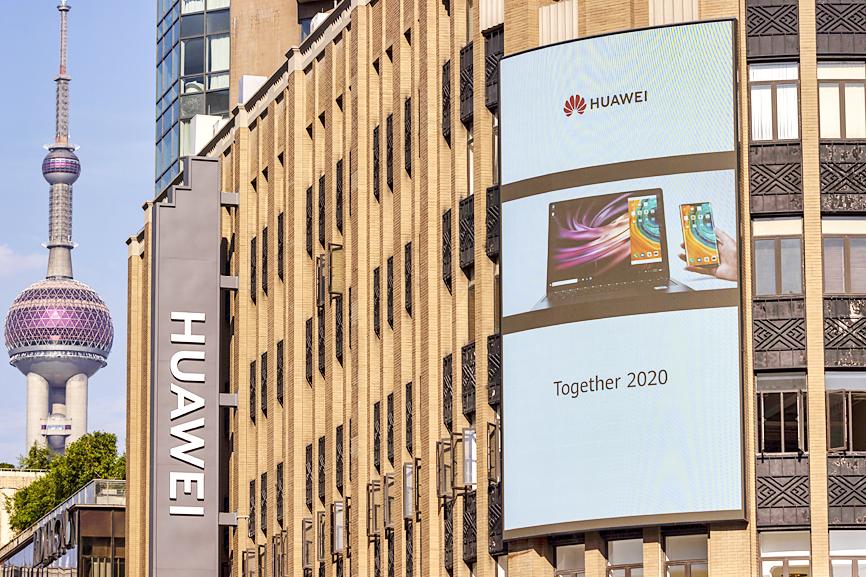China’s Huawei Technologies Co (華為) and ZTE Corp (中興) are to be kept out of India’s plans to roll out its 5G networks as relations between the two countries hit a four-decade low following deadly border clashes.
The South Asian nation would apply investment rules amended on July 23 that cite national security concerns to restrict bidders from nations it shares land borders with to keep out the companies, people familiar with the issue said, asking not to be identified, citing rules for speaking with the media.
The Indian Ministry of Communications is to restart pending discussions on approvals for 5G trials by private companies, including Bharti Airtel Ltd, Reliance Jio Infocomm Ltd and Vodafone Idea Ltd that were delayed by the nationwide lockdown, they said.

Photo: EPA-EFE
India’s decision echoes actions by the US, UK and Australia, which have raised red flags about the companies’ Chinese government links.
The US Federal Communications Commission has officially declared both companies national security threats.
The process to auction 5G may spill into next year, the officials said.
A decision on the ban is expected to be announced in a week or two after approval from the prime minister’s office, they said.
While India allowed Huawei to participate in its 5G trials earlier this year, its stance against Chinese companies hardened after Beijing’s actions along their disputed border in early May. That military standoff, which turned deadly in June, killing 20 Indian soldiers and an unknown number of Chinese troops, is now in its fourth month.
In late June, India banned ByteDance Ltd’s viral short-video service TikTok and dozens of other Chinese apps, citing threats to its sovereignty and security.
“Telecom infrastructure has become part of national security assets and nations are looking at controlling and regulating them just like they do power and water,” said Nikhil Batra, Sydney-based analyst at International Data Corp (IDC).
“But the Indian market is already battling infrastructure and regulatory problems. The network equipment market is a small one. So India’s challenges will compound from such a decision,” Batra said.
Telecom companies were expected to invest US$4 billion in setting up 5G infrastructure, according to IDC estimates.
That could be tough as companies, including Bharti, Vodafone Group PLC and even state-run firms, continue to struggle to make existing 4G networks profitable.
There is already heavy reliance on Chinese equipment in its 4G networks, and shutting doors to Huawei and ZTE could increase costs of a switch to 5G by as much as 35 percent, SBICAP Securities Ltd research head Rajiv Sharma said.
Reliance could be a serious challenge to Huawei in the world’s second-biggest wireless market after Indian billionaire Mukesh Ambani on July 15 announced plans to soon roll out a 5G network for his Jio Infocomm using a technology developed in-house, without giving details.
Yet, with its economy headed for a “deep slump” amid a worsening COVID-19 pandemic, the government might not be in a position to push for a 5G spectrum auction in the near future.

Taiwanese suppliers to Taiwan Semiconductor Manufacturing Co. (TSMC, 台積電) are expected to follow the contract chipmaker’s step to invest in the US, but their relocation may be seven to eight years away, Minister of Economic Affairs J.W. Kuo (郭智輝) said yesterday. When asked by opposition Chinese Nationalist Party (KMT) Legislator Niu Hsu-ting (牛煦庭) in the legislature about growing concerns that TSMC’s huge investments in the US will prompt its suppliers to follow suit, Kuo said based on the chipmaker’s current limited production volume, it is unlikely to lead its supply chain to go there for now. “Unless TSMC completes its planned six

Intel Corp has named Tasha Chuang (莊蓓瑜) to lead Intel Taiwan in a bid to reinforce relations between the company and its Taiwanese partners. The appointment of Chuang as general manager for Intel Taiwan takes effect on Thursday, the firm said in a statement yesterday. Chuang is to lead her team in Taiwan to pursue product development and sales growth in an effort to reinforce the company’s ties with its partners and clients, Intel said. Chuang was previously in charge of managing Intel’s ties with leading Taiwanese PC brand Asustek Computer Inc (華碩), which included helping Asustek strengthen its global businesses, the company

Power supply and electronic components maker Delta Electronics Inc (台達電) yesterday said second-quarter revenue is expected to surpass the first quarter, which rose 30 percent year-on-year to NT$118.92 billion (US$3.71 billion). Revenue this quarter is likely to grow, as US clients have front-loaded orders ahead of US President Donald Trump’s planned tariffs on Taiwanese goods, Delta chairman Ping Cheng (鄭平) said at an earnings conference in Taipei, referring to the 90-day pause in tariff implementation Trump announced on April 9. While situations in the third and fourth quarters remain unclear, “We will not halt our long-term deployments and do not plan to

The New Taiwan dollar and Taiwanese stocks surged on signs that trade tensions between the world’s top two economies might start easing and as US tech earnings boosted the outlook of the nation’s semiconductor exports. The NT dollar strengthened as much as 3.8 percent versus the US dollar to 30.815, the biggest intraday gain since January 2011, closing at NT$31.064. The benchmark TAIEX jumped 2.73 percent to outperform the region’s equity gauges. Outlook for global trade improved after China said it is assessing possible trade talks with the US, providing a boost for the nation’s currency and shares. As the NT dollar